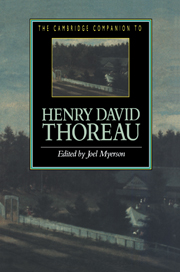Book contents
- Frontmatter
- 1 Thoreau’s reputation
- 2 Thoreau and Concord
- 3 Thoreau and Emerson
- 4 A Week on the Concord and Merrimack Rivers
- 5 Thoreau as poet
- 6 Thoreau and his audience
- 7 Walden
- 8 Thoreau in his Journal
- 9 The Maine Woods
- 10 A wild, rank place
- 11 Thoreau’s later natural history writings
- 12 Thoreau and the natural environment
- 13 Thoreau and reform
- Further reading
- Index
- Series List
4 - A Week on the Concord and Merrimack Rivers
Published online by Cambridge University Press: 28 May 2006
- Frontmatter
- 1 Thoreau’s reputation
- 2 Thoreau and Concord
- 3 Thoreau and Emerson
- 4 A Week on the Concord and Merrimack Rivers
- 5 Thoreau as poet
- 6 Thoreau and his audience
- 7 Walden
- 8 Thoreau in his Journal
- 9 The Maine Woods
- 10 A wild, rank place
- 11 Thoreau’s later natural history writings
- 12 Thoreau and the natural environment
- 13 Thoreau and reform
- Further reading
- Index
- Series List
Summary
“There is nothing very good to tell you of the people here, no books, no poets, no artists; nothing but their incessant activity as pioneers &geographers, ” Emerson wrote an English friend in May 1849. Despite his usual complaint that the “material problem ” of opening up new territories engrossed so much of the energy of Americans, Emerson expressed a hope that his country would nonetheless soon produce a major writer, adding: “I ought to say, however, that my friend Thoreau is shortly to print a book called 'A Week on the Concord &Merrimack Rivers,' which, I think, will win the best readers abroad &at home. ”' As that afterthought indicates, Emerson clearly did not believe that his young friend was the “great one ” he prophesied. Even his tepid prediction that A Week would attract “the best readers ” proved to be overly optimistic, for Thoreau’s first book was read by very few people in either England or the United States. Now that Thoreau is widely viewed as one of the “classic ” American authors, A Week has gained a larger audience. Yet it is probably his least familiar book, one that is almost completely overshadowed by Walden.
The relative neglect of A Week is not terribly surprising. For one thing, it is a very long book, nearly four hundred pages in the Princeton edition of The Writings of Henry D. Thoreau. What Dr. Samuel Johnson said of Milton’s Paradise Lost, that "none ever wished it longer than it is," is perhaps equally true of A Week. Moreover, although it initially seems to be a fairly straightforward travel book, much of the text of A Week is devoted to a series of essays or "digressions" on subjects ranging from the Christian church and books ("Sunday"), through Hindu scripture ("Monday") and friendship ("Wednesday"), to writers like the Greek lyricist Anacreon ("Tuesday"), the Roman satirist Aulus Persius Flaccus ("Thursday"), and the British poets Ossian and Chaucer ("Friday").
- Type
- Chapter
- Information
- The Cambridge Companion to Henry David Thoreau , pp. 40 - 56Publisher: Cambridge University PressPrint publication year: 1995
- 2
- Cited by

